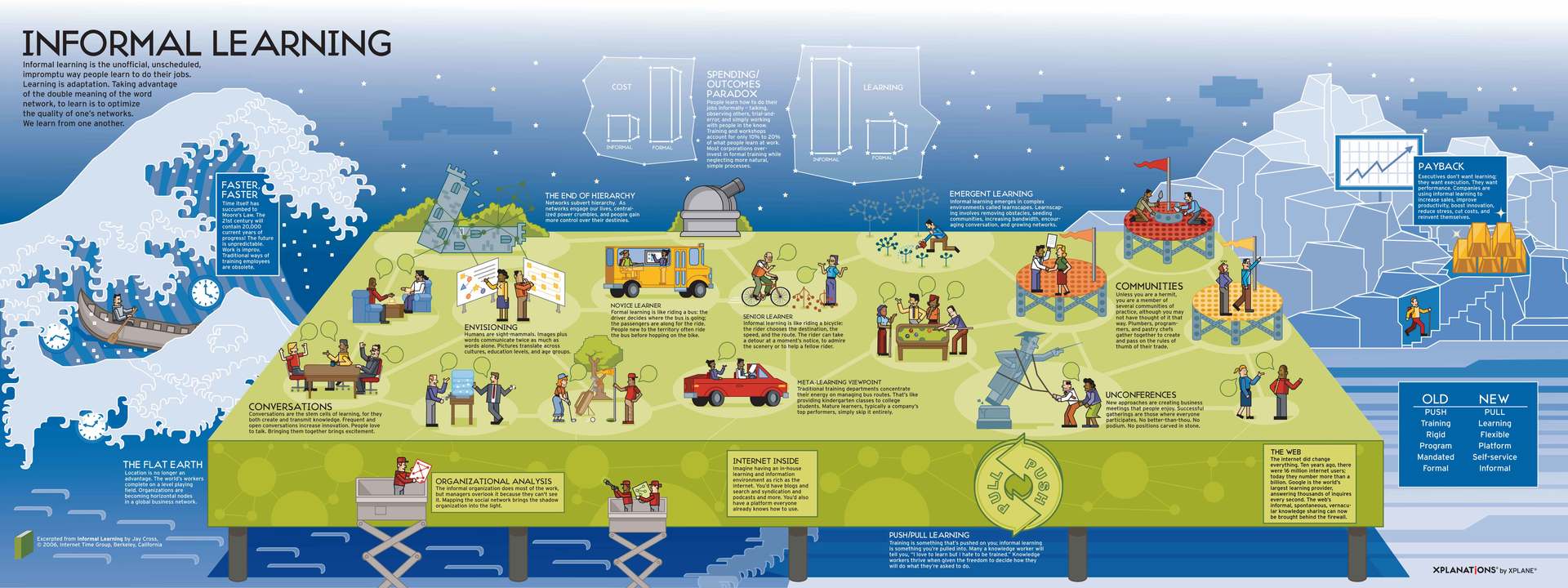Is Informal Learning The Key To Driving Innovation In The Workplace?
Informal learning is often overlooked in the workplace, but it can be a transformational training tool. This is because it doesn't happen in workshops or training courses but comes naturally through on-the-job learning, collaboration with peers, and conversations with colleagues. Think of all the times you shared your knowledge with your teammates or asked your manager for their insight; this is informal learning, and it's also a great way to ignite innovation at work. This is because people often think differently and develop unique solutions to navigate challenges and achieve goals. Now let's explore how informal learning facilitates that and how you can spread it throughout the company.
The Role Of Informal Learning In Out-Of-The-Box Thinking
Flexibility And Adaptability
Flexibility is much needed in a workplace, especially one that's fast-paced. Informal learning gives each employee control over how they'll gain information and from whom. For example, let's say your company introduces new software. You may not be a tech expert, so you'll need some help. Instead of watching lengthy tutorials or scrolling through PDFs and manuals, you turn to a colleague who knows their way around tools and programs to show you how the software works. So, with informal learning, you have plenty of options to gain knowledge on the spot during your moment of need.
Encouraging Creativity
When people aren't confined to classrooms, workshops, and curricula, creativity tends to flourish. They feel free to express their thoughts, voice their opinions, and share their ideas with the rest of the team. This is especially beneficial for brainstorming sessions or meetings. If you've encouraged informal learning in your company, it's during those times that you'll notice the creativity flowing. People will openly share their ideas knowing that each one is welcome. Plus, when employees from different backgrounds and experiences share their perspectives and come together, they're more likely to come up with feasible solutions.
Culture Of Experimentation
Innovation can't thrive without experimentation. Informal learning encourages employees to experiment because it empowers them to think outside the box. They are free to explore new concepts with the help of their colleagues and peers, thus gaining enough knowledge to form unique ideas that they are willing to test out. They're not afraid to try new things to help the company, and they're not scared to fail. Even if they do, they have their team's support and they can get enough information to move on or experiment all over again. Of course, to create this culture of experimentation, you need support from leadership. They need to celebrate innovations and risk taking to encourage their workforce.
How To Promote Informal Learning In The Workplace
Create A Supportive Environment
To foster informal learning and free thinking, you need to create a supportive environment where every idea is welcome and mistakes are seen as opportunities for development. You can achieve this by establishing open communication practices, making your employees feel comfortable expressing themselves and sharing their opinions and experiences openly. Leaders should set the tone and participate in informal learning activities themselves. For example, the company's CEO could ask for help during a meeting or initiate a conversation where everyone can share their thoughts.
Use Technology
Social platforms or learning systems with social features can foster informal learning. From short courses to webinars, your employees can join any eLearning course and then hop into a chatting app or discussion forum to exchange ideas and knowledge with their peers. You can also leverage collaborative platforms for group projects where staffers can share their insights, seek help, and offer tips and tricks to those who need them. This not only promotes informal learning but also boosts productivity.
Establish Mentorship Programs
Who is better at sharing knowledge about the job than seasoned employees? Your company should tap into their expertise and organize mentorship programs. These not only allow people to share everything they know with their peers but also help new or less experienced employees navigate their roles and careers. Mentors are always by their mentees' side, guiding them through tasks and responsibilities, and equipping them with enough knowledge to increase their confidence. This way, sharing knowledge among team members will become a regular habit in your workplace.
Implement Feedback Loops
Managers, colleagues, and partners need to engage in ongoing conversations, giving feedback to one another. This will help your company realize if the informal learning practices work or if they need some fine-tuning. Feedback should be given at any stage so that people can check their progress and have time to implement it in their daily tasks. For instance, if you, as a social media manager, have discussed some new social media trends with other colleagues, you can apply them to your marketing strategy. Then, they can share their opinion so you can either make improvements or keep up the good work.
Balance Informal And Formal Learning
Informal learning may sound more fun and natural than structured formal learning, but these two should coexist. To strike a balance between the two, you need to create an environment that values both. For a start, slowly integrate informal learning into standard learning practices. So, after your employees have finished a course οn their learning platform, encourage them to meet up to discuss it either in a meeting or a group chat in one of your communication channels. Once you achieve the perfect mix, you'll notice how one enhances the other.
Conclusion
Informal learning shouldn't be overlooked merely because it's not as structured as formal methods of training. In fact, it can give employees the freedom to express themselves and venture outside of their professional comfort zone. If you're looking for ways to motivate your team to think more innovatively, try following the above tips and let ideas flow freely in your company.








